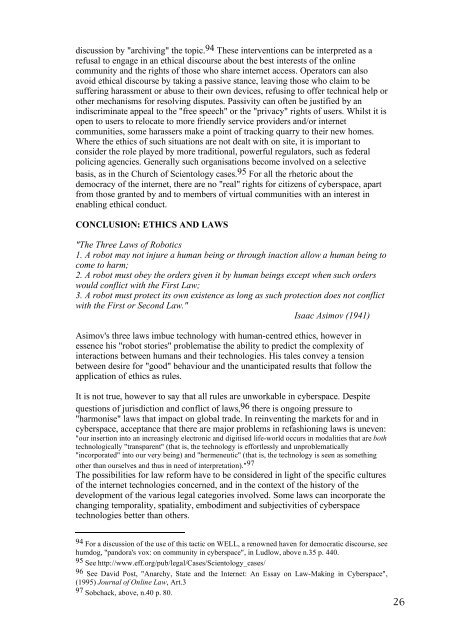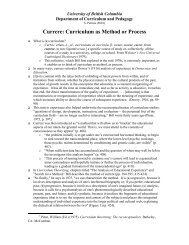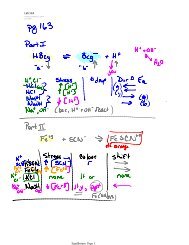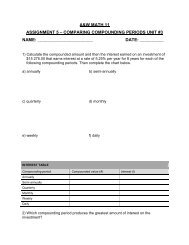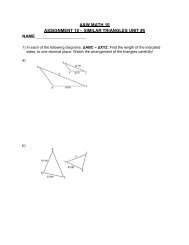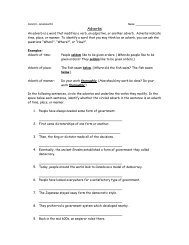ETHICAL BOUNDARIES AND INTERNET CULTURES
ETHICAL BOUNDARIES AND INTERNET CULTURES
ETHICAL BOUNDARIES AND INTERNET CULTURES
You also want an ePaper? Increase the reach of your titles
YUMPU automatically turns print PDFs into web optimized ePapers that Google loves.
discussion by "archiving" the topic. 94 These interventions can be interpreted as a<br />
refusal to engage in an ethical discourse about the best interests of the online<br />
community and the rights of those who share internet access. Operators can also<br />
avoid ethical discourse by taking a passive stance, leaving those who claim to be<br />
suffering harassment or abuse to their own devices, refusing to offer technical help or<br />
other mechanisms for resolving disputes. Passivity can often be justified by an<br />
indiscriminate appeal to the "free speech" or the "privacy" rights of users. Whilst it is<br />
open to users to relocate to more friendly service providers and/or internet<br />
communities, some harassers make a point of tracking quarry to their new homes.<br />
Where the ethics of such situations are not dealt with on site, it is important to<br />
consider the role played by more traditional, powerful regulators, such as federal<br />
policing agencies. Generally such organisations become involved on a selective<br />
basis, as in the Church of Scientology cases. 95 For all the rhetoric about the<br />
democracy of the internet, there are no "real" rights for citizens of cyberspace, apart<br />
from those granted by and to members of virtual communities with an interest in<br />
enabling ethical conduct.<br />
CONCLUSION: ETHICS <strong>AND</strong> LAWS<br />
"The Three Laws of Robotics<br />
1. A robot may not injure a human being or through inaction allow a human being to<br />
come to harm;<br />
2. A robot must obey the orders given it by human beings except when such orders<br />
would conflict with the First Law;<br />
3. A robot must protect its own existence as long as such protection does not conflict<br />
with the First or Second Law."<br />
Isaac Asimov (1941)<br />
Asimov's three laws imbue technology with human-centred ethics, however in<br />
essence his "robot stories" problematise the ability to predict the complexity of<br />
interactions between humans and their technologies. His tales convey a tension<br />
between desire for "good" behaviour and the unanticipated results that follow the<br />
application of ethics as rules.<br />
It is not true, however to say that all rules are unworkable in cyberspace. Despite<br />
questions of jurisdiction and conflict of laws, 96 there is ongoing pressure to<br />
"harmonise" laws that impact on global trade. In reinventing the markets for and in<br />
cyberspace, acceptance that there are major problems in refashioning laws is uneven:<br />
"our insertion into an increasingly electronic and digitised life-world occurs in modalities that are both<br />
technologically "transparent" (that is, the technology is effortlessly and unproblematically<br />
"incorporated" into our very being) and "hermeneutic" (that is, the technology is seen as something<br />
other than ourselves and thus in need of interpretation)." 97<br />
The possibilities for law reform have to be considered in light of the specific cultures<br />
of the internet technologies concerned, and in the context of the history of the<br />
development of the various legal categories involved. Some laws can incorporate the<br />
changing temporality, spatiality, embodiment and subjectivities of cyberspace<br />
technologies better than others.<br />
94 For a discussion of the use of this tactic on WELL, a renowned haven for democratic discourse, see<br />
humdog, "pandora's vox: on community in cyberspace", in Ludlow, above n.35 p. 440.<br />
95 See http://www.eff.org/pub/legal/Cases/Scientology_cases/<br />
96 See David Post, "Anarchy, State and the Internet: An Essay on Law-Making in Cyberspace",<br />
(1995) Journal of Online Law, Art.3<br />
97 Sobchack, above, n.40 p. 80.<br />
26


